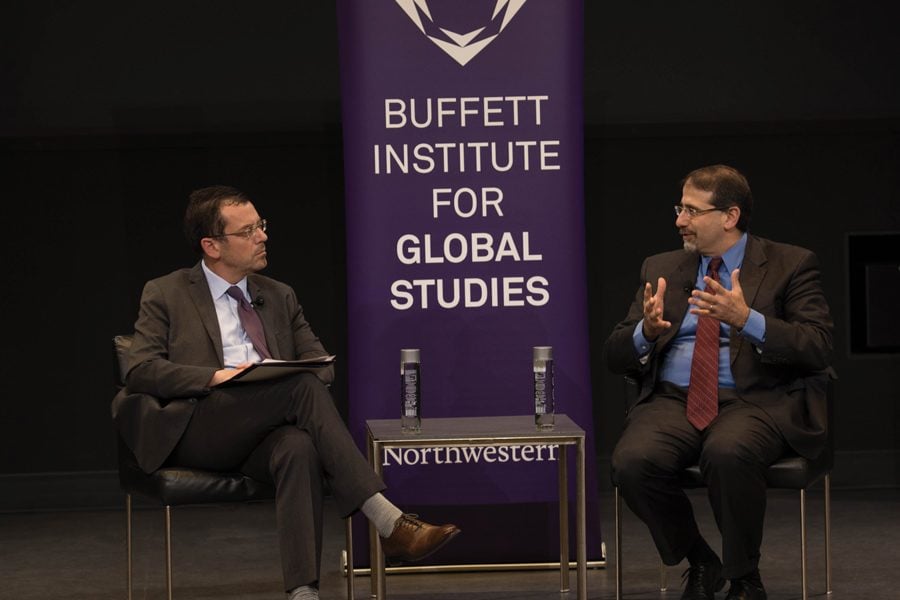Former US ambassador to Israel talks Israeli-Palestinian conflict, Trump
Alison Albelda/The Daily Northwestern
Daniel Shapiro and Brian Edwards speak at a Buffett Institute event on Thursday. The former U.S. ambassador to Israel discussed his views on the Israeli-Palestinian conflict and the role of social media in politics.
April 27, 2018
Former U.S. ambassador to Israel Daniel Shapiro said Thursday that the only outcome that can resolve the ongoing Israeli-Palestinian conflict is a “two-state solution” that will create an independent Israel and Palestine.
The event, held at McCormick Foundation Center, was hosted by the Buffett Institute for Global Studies and moderated by Brian Edwards, director of the Middle East and North African studies program. Shapiro, who was the U.S. ambassador to Israel from July 2011 to January 2017, also advised former President Barack Obama on U.S. responses to the 2010 Arab Spring uprisings.
Shapiro said both Israeli and Palestinian leaders are constrained by their own publics, who remain divided over the Palestinian cause. It remains a challenge for both leaders to defend their people, Shapiro said.
He added that although he believes there is only one resolution, other possible outcomes include an “extended version of the status-quo,” or the one-state solution, in which Israel annexes more or all of the West Bank.
Edwards and Shapiro also talked about Israel’s overall response to the 2016 presidential election.
“Israelis are used to messy and outrageous political discourse among their own politicians,” Shapiro said, “but they tend to hold Americans to higher standards. To see our own elections conducted at such a low-level discourse was very unnerving.”
Shapiro said President Donald Trump is more popular in Israel than most other parts of the world.
“It’s interesting which aspects of Trump travel and which don’t.” Edwards added. “Things like his infidelity really played into the idea of a political strongman in Israel.”
Shapiro and Edwards also discussed the growing influence of social media in politics and diplomacy. They specifically addressed Trump’s use of Twitter as a political tool.
“A leader who is willing to talk in that tough discourse — willing to humiliate public opponents, criticize the media as the perpetrator of fake news to a certain constituency, it has quite a resonance,” Shapiro said. “To others, it is somewhere between entertaining and disturbing.”
Although platforms like Facebook used to have the power to mobilize thousands of people for mass protests, Shapiro said, authoritarian governments have learned how to use social media to their own advantages.
“Any technology can be used for good or for ill,” Shapiro said. “It can be used to empower people or repress people.”
Shapiro also said he finds the “emerging alignment among right-wing national movements” disturbing, referring in particular to the 2017 Charlottesville “Unite the Right” rally. There is an emerging danger of the normalization and allowance of anti-Semitic speech for political gain, he said.
Bruce Carruthers, director of the Buffett Institute, told The Daily the program brought Shapiro to NU in an effort to enrich learning by creating opportunities for people to meet with experts on critical regions of the world.
“(Shapiro) is someone who is able to engage different groups in a positive way,” Carruthers said, “not just to be an insider and speak jargon to the other experts, but someone who is willing to answer questions for young people who are younger, but have lots of energy and passion.”
Email: amyli2021@u.northwestern.edu



